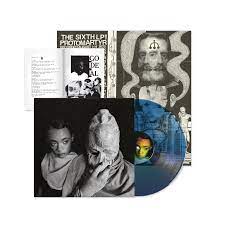First pressing on limited edition indie exclusive blue vinyl!
The Detroit post-punk band Protomartyr have mastered the art of evoking place: the grinding Midwest humility of their hometown, as well as the x-rayed elucidation of America that comes with their vantage. Protomartyr—vocalist Joe Casey, guitarist Greg Ahee, drummer Alex Leonard, and bassist Scott Davidson—have become synonymous with caustic, impressionistic assemblages of politics and poetry, the literal and oblique.
The group’s sixth album, recorded at Sonic Ranch in Tornillo, Texas, is called Formal Growth In The Desert. And though frontman Joe Casey did have a humbling experience staring at awe-inspiring Sonoran rock formations and reckoning with his own smallness in the scheme of things – as recounted in the single ‘Elimination Dances’ – the title is not necessarily a nod to the sandy expanses of the southwest. “The desert is more of a metaphor or symbol,” Casey says, “of emotional deserts, or a place or time that seems to lack life.”
The “growth” came from a period of colossal transition for Casey, including the death of his mother. The pandemic years also brought on other inner quandaries about the purpose and feasibility of a musician’s life. But life does go on, and Casey describes the great theme of Formal Growth In The Desert as an embrace and acknowledgment of that fact: a 12-song testament to “getting on with life,” even when it feels impossibly hard.
Guitarist Greg Ahee, who co-produced Formal Growth In The Desert alongside Jake Aron (Snail Mail, L’Rain), knew what Casey was going through. Conceptualizing the music, he considered how to make it all “like a narrative film.” Having recently scored a pair of short films, Ahee found himself immersed in the cinematic Spaghetti Western music of Ennio Morricone.
The filmic sensibility is manifest in Casey’s storytelling, too, whether he’s critiquing ominous techno-capitalism or processing aging, the future, and the possibility of love. Casey calls the centerpiece, ‘Graft Vs. Host’, written in the immediate wake of his mother’s death, the heaviest song on the record, but it is also among Protomartyr’s most beautiful. It was the first Formal Growth In The Desert song that came together for the band in a room—an emblem of “trying to put sadness behind me, to see if I can let love into my life.” It culminates on a pummeling loop, which for Casey felt fitting: “I really like that idea: the band keeps going.”

